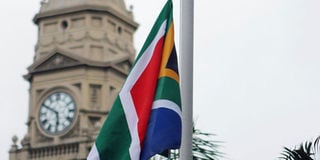Breaking News: KDF chopper crash kills five in West Pokot
More South African 'state capture', graft suspects being hauled to courts

In June last year, some $33 million in assets owed by members of the family in S Africa were seized by the NPA's Investigating Directorate.
Those involved in South Africa's runaway corruption, especially in government, are increasingly being reeled in, with a growing list of formerly powerful figures charged and facing potentially long jail sentences.
Almost daily, former and current government workers, along with their private sector collaborators in corruption, are being hauled to courts, suspended or sued to recover stolen funds.
With Chief Justice Raymond Zondo still to hand over the final instalment of his four-part report on the workings and culprits behind the 'state capture' system of thievery from the public purse, some that he already named have been charged with corruption-related crimes.
Numerous others, some still luminaries in the ruling African National Congress (ANC) party, stand to face the same fate, with a specialised prosecution unit already set up to ensure, as promised by President Cyril Ramaphosa, that Justice Zondo's recommendations for prosecutions are followed through.
The National Prosecuting Authority (NPA), stung by opposition party and public criticism of promised but seemingly slow-moving prosecutions of the plunderers of state coffers, estimated to have cost $100 billion, has insisted that it is determined to hunt down culprits and where possible recover stolen money.
It is following through with those undertakings.
Despite stalling tactics, termed the 'Stalingrad defence', as famously adopted by former president Jacob Zuma and now also by a growing band of similarly accused corrupt players, the numbers of people charged with major corruption now runs into the dozens.
Not yet charged, but still being internationally sought, are the infamous 'Gupta brothers', a family of Indian immigrants who became close to Zuma and other leading political figures, and who developed a multimillion-dollar business empire on the back of such associations.
Efforts from afar by the family, now reportedly living in Dubai after fleeing S Africa, to head off the seizure of their remaining assets were last week rejected in the courts.
In June last year, some $33 million in assets owed by members of the family in S Africa were seized by the NPA's Investigating Directorate.
Earlier this month, local media hailed a 'big state capture win' for the prosecuting authorities as the High Court overturned a prior court ruling that had reversed frozen Gupta-linked assets.
The money was allegedly looted by the Guptas and collaborators in the national rail mover Transnet, amounting to just over $100 million.
Importantly, the High Court said that there were ‘reasonable grounds’ for believing that a corporate financial advisory company allegedly involved in aiding the looting, Regiments Capital, could be prosecuted for its role, with three of its directors potentially convictable of corruption.
The co-targeting of corrupt officials and their private sector collaborators and corruptors was promised by President Ramaphosa after he came to power in 2018 on the back of a growing tide of anti-graft sentiment.
Much criticism had mounted through 2020 as those promises to clean up both ANC and corrupt elements 'deployed' by the ruling party in key government positions appeared to be largely falling short.
But as 2021 progressed, a number of cases came to court, including allegedly corrupt private sector players and 'captured elements' in the prisons services, and the crippled national power-producer Eskom. These parties were charged in most instances with fraud, corruption and money-laundering.
This year the rate of new cases coming to the courts has dramatically risen, along with efforts to reclaimed stolen funds, often long since relocated offshore with extensive efforts to launder such illicitly gained money.
This week alone, there have been more corruption-related arrests, including of six figures involved with a mutual bank, VBS, in which thievery of customer cash became rampant before authorities stepped in.
In 2018, VBS was declared insolvent and bankrupt and placed under curatorship, with customers defrauded out of roughly $150 million, though that move came late, with authorities long aware that many ANC-run municipalities were placing public funds in the mutual bank, against public funding laws.
Only when the bank could no longer pay its way was action taken against it, underlining the widely felt sense that the ANC was incapable of getting on top of its own and, therefore, the country's corruption problems.
But the recent steady stream of arrests, court appearances – including Zuma himself and several of his close associates – have begun to impact the collective awareness.
Also, earlier this month, the former chief financial officer of a municipality in Limpopo province, on S Africa’s north-eastern border with Mozambique, was arrested over his role in the VBS scandal.
Given that the scandal hit hardest many of the bank's 30,000 customers, including some of the poorest citizens, some four years ago, the arrest and charging of a high-level ANC deployee was seen as a welcome change but one that was long overdue.
Senior ANC sources say these arrests and court appearances were "not a flash in the pan" nor merely playing to public demands but a vital necessity, as perceived by Ramaphosa and those close to him.
Ramaphosa, with Zondo's damning findings against the ruling party itself in mind, said as much, promising: "The fight against corruption will take on a new intensity."
The actions have sent fear coursing through Zuma-aligned elements in the ruling party, while sparking hope for a corruption-free future in S Africans, who have endured the long-term effects of endemic corruption, such as poor or no services and daily power outages.




